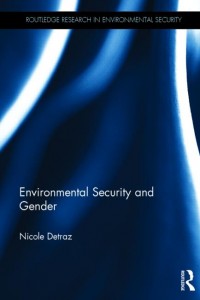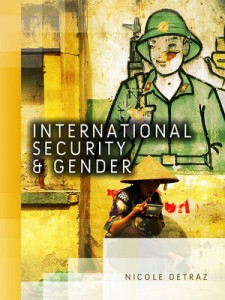Security is a uniquely important concept in the modern world. In the global news, we hear stories daily about the wars in Iraq and Afghanistan, about domestic-level conflicts around the world, about ideas like “cybersecurity” and social security. This broad list highlights the fact that security is an idea with multiple meanings. Common understandings of security range from inter-state war and conflict studies to a concern for well-being at an individual level. My research broadly explores the connections between security, the environment, and gender. I have published articles on the implications of conceptualizing climate change as a security issue, as well as pieces that examine how gender complements and challenges discourses of environmental security. These articles have appeared in Security Studies, International Studies Perspectives, International Feminist Journal of Politics and Global Environmental Politics.
My first book which addressed security, International Security and Gender, was published by Polity Press. The book provides an introduction to the links between gender and security by analyzing some of the key issues and topics within security studies through gender lenses. The book challenges narrow ideas of security and provides an alternative conceptualization that seeks to broaden understandings of security. By examining issues of militarization, peacekeeping, terrorism, human security, and environmental security, the book considers how looking at security through gender lenses pushes us to ask different questions and broaden our sphere of analysis. The central argument running through the text is that considering security through gender lenses challenges the primacy of some traditional security concepts and shifts the focus to be more inclusive.
The book argues the necessity of including gender into discussions and evaluations of security and security concerns. I highlight the ways in which incorporating gender complements the current discussions as well as the ways in which gender alters these discussions. Security scholarship has shifted from being narrowly concerned with state security and war to broadly considering a host of security threats and issues. Each of these elements of security scholarship has a unique relationship with gender- or socially constructed ideas about what men and women ought to be. This project demonstrates that security debates exhibit gendered understandings of key concepts, and these gendered assumptions and understandings benefit particular people and are often detrimental to others, particularly as they influence the process of policy-making.
There is a danger, however, in a simplistic analysis that automatically views women as victims in times of war. This volume calls for a more nuanced understanding of the particular experiences of women and men during times of conflict. This caution is echoed by many feminists who argue against simplistic notions of peaceful women and aggressive men. The automatic connection of women with an uncomplicated definition of peace has worked to devalue both women and peace. A project that unquestioningly asserts an association between women and peace may actually serve to disempower women by defining them in opposition to the ideas that security studies considers most crucial, specifically strategizing for and fighting in wars. This book explores gendered understandings of security rather than simply the roles and responses of women in the security debate. Gender analysis involves examining gender-based divisions in society and differential control of/access to resources. This is different than an approach seeking to bring women into an analysis, which can isolate women from the broader socio-cultural context in which behavioral norms are embedded. Therefore, the book not only explores the particular position of women and men within the context of security, but also investigate the objects of study and the specific language used in the present security discussions for examples of gendered implications.
My second book, Environmental Security and Gender, was recently published by Routledge. This book explores the connections between security, the environment, and gender. The project employs a variety of qualitative research methods, including discourse analysis, gender analysis, and case studies to examine the role of gender in recent debates about the connections between security and the environment. Over the past 20 years scholars, policymakers, and the media have increasingly recognized the links between both traditional and nontraditional security issues and the changing condition of the global environment. Concepts like “environmental security” and “resource conflict” have been used to hint at these significant linkages. While there has been scholarship that seeks to identify the ways that academics link these concepts, there has been little systematic work to examine the intersection between security, the environment, and gender. This book addresses this vital topic.
I have always had an interest in security studies and I intend to continue my research on the connections between security, gender, and the environment into the future. Security has had a central place in International Relations, and as security discourses have shifted over time this centrality of security studies remains. New approaches to security concepts and policymaking, like human security and environmental security, allows for the continued relevance of security studies. My research explores this broadening and deepening of security scholarship with the goal of highlighting the important ways that gender identity and environmental change intersect with various security issues. This is in line with my overall goal to further our understanding of potential insecurities of both human populations and ecosystems.

